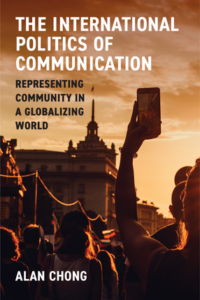About the Seminar
We live in an era of disinformation and rapid-fire verbal conversations. Worse, certain populist governments have taken to substituting dramatic made-for-media footage for meaningful political action. This book intends to address the international politics of communication in terms of its existence as an interdisciplinary junction of International Relations, Political Science and Communication Studies. The international politics of communication manifests as contestations of communitarian meaning in the symbolic realm worldwide, being co-constituted in tandem with the political decisions of terrestrial nation-states. The subsequent analysis will therefore be situated in the spaces afforded by the interplay between ‘soft’ ideational antagonisms and ‘hard’ power politics played out on any pocket of international ground. The ensuing discussion in the rest of the book will therefore supply the context for the international politics of communication by pondering the relationships between information flow and the staging of politics, extending into relationships between meaning and community, as well as politics and technology. All these are integrated into the central question of how community can or should be represented.
The detailed illumination of these relationships will be treated in three parts in the book. Firstly, it investigates the power behind the sources of information; the medium of conducting that information; and the audiences that respond. Secondly, the book expands the understanding of international political communication into a set of topics encapsulated by the theme of community. Community is intrinsic to any study of communication since it is both the backdrop and purpose of any exchange of information. Community is treated in terms of ‘nationalism and inter-civilizational dialogue’, ‘development and communication’ and debates over ‘transparency and good governance’. Thirdly and finally, there is socialisation, understood as instruments or deliberate processes for making and unmaking the aforementioned forms of community. Under this theme, diplomacy and propaganda are immediately relevant as objects of study, along with transnational Internet politics, international/peace education, tourism and the politics of popular culture in film. In short, communication across borders embodies today’s complex realities of participating in global politics.
About the Author
Alan Chong is Senior Fellow at the Centre for Multilateralism Studies within the S. Rajaratnam School of International Studies (RSIS) in Singapore. He has published widely on the notion of soft power and the role of ideas in constructing the international relations of Singapore and Asia. This has stemmed from his doctoral work on soft power in the early 2000s. These ideational angles have also led to inquiry into some aspects of ‘non-traditional security’ issues in Asia. His publications have appeared in The Pacific Review; Contemporary Southeast Asia; South East Asia Research; Cambridge Review of International Affairs; Armed Forces and Society; Journal of Strategic Studies; Global Studies Quarterly, Geopolitics, and the Review of International Studies. He has also edited the book International Security in the Asia-Pacific: Transcending ASEAN towards Transitional Polycentrism (Palgrave, 2018), and served as co-editor (with Quang Minh Pham) of Critical Reflections on China’s Belt and Road Initiative (Cham: Springer Nature under the imprint of Palgrave Macmillan, 2020). In 2023, he co-edited with Nicole Jenne, under the Bristol University Press imprint a book titled Asian Military Evolutions: Civil-Military Relations in Asia. His interest in soft power has also led to inquiry into the sociological and philosophical foundations of international communication. This culminated in the publication of The International Politics of Communication: Representing Community in a Globalizing World (University of Michigan Press, 2025). Alan Chong can be contacted at: [email protected]
About the Discussants
Patrick Quinton-Brown joined SMU as an Assistant Professor of International Relations in 2023. Previously he was a Departmental Lecturer in International Relations at the University of Oxford where he also held a Senior College Lectureship at University College. From January 2021 to October 2022, he was a Postdoctoral Fellow at the Asia Research Institute in the National University of Singapore. His articles have appeared in journals including International Affairs, International Relations, Millennium, and Review of International Studies. His research interests cover theories of international relations and global governance; international institutions and organisations; interpretive and postcolonial approaches; and the Global South in historical international society. His first book, Intervention before Interventionism: A Global Genealogy, was published with Oxford University Press in 2024.
Gulizar Haciyakupoglu is a Senior Associate Fellow at the Centre of Excellence for National Security (CENS), S. Rajaratnam School of International Studies (RSIS), Nanyang Technological University (NTU). Her research concerns influence operations, including disinformation campaigns, and online harms, including the gender-based impacts of online harms. She is the co-editor of the volume titled Gender and Security in Digital Space: Navigating Access, Harassment, and Disinformation. Her publications have appeared in various academic and policy outlets, including the Journal of Computer-Mediated Communication and Defence Strategic Communications. She holds a PhD from the National University of Singapore (NUS), Communications and New Media Department (CNM), and an MA in Political Communication from the University of Sheffield. She received her bachelor’s degree in Global and International Affairs from the Dual-Diploma Programme of the State University of New York (SUNY) Binghamton, and Bogazici University, Turkey.



 Add to Google calendar
Add to Google calendar
 Add to Outlook calendar
Add to Outlook calendar




